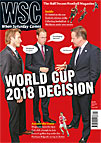 Dave Lee watches Abbey United v Bully Wee United – two of the UK’s supporters’ clubs
Dave Lee watches Abbey United v Bully Wee United – two of the UK’s supporters’ clubs
It’s 10.30am, and in the car park of a leisure centre, manager Richard French nervously thumbs out a text message. It’s half an hour until kick-off, and there is still no sign of today’s opponents. He’d last heard from the opposition manager an hour ago. They had just passed Birmingham, but the minibus was limited to a paltry 60mph. And, after a night of heavy snow, they were down to just 11 men after one of their number found himself snowed in.
Meanwhile, the home team are struggling to keep warm in conditions which will later see many football matches around the country called off. But soon, and with just 15 minutes to spare, the minibus carrying Bully Wee United swings into sight. The players duly hop out and head for the pitch, albeit a tad wearily, with extremely stiff legs. Their journey had started some eight hours ago at the Broadwood Stadium, home to Clyde Football Club. As Clyde’s supporters’ team, Bully Wee are well-used to travelling the length and breadth of the country playing other Scottish teams. But today sees them facing a cup tie against Abbey United, the supporters of Cambridge United. And with it, a round trip of around 620 miles. It’s the first round of the Internet Football Association (IFA) Cup, the knockout competition of a football organisation that involves dedicated teams of fans from all over the UK and beyond.
Founded just prior to Euro 96, the IFA has set about trying to reverse a negative view of England’s supporters. “What started off as a straight forward jibe at [then head of the FA] Graham Kelly when he said that England fans couldn’t behave themselves during Euro 96 picked up steam,” explains John Boocock, who has been running the IFA since 1997. It now boasts a diverse roster of over 100 teams, including a squad of Arsenal fans based in Nigeria who come over every year to compete in the IFA’s two-day WorldNET competition.
For a number of reasons – namely sporadic fixtures, the mixing of men and women players and minor tweaks in the rulebook – the IFA has been unable to gain the backing of the FA. The organisation therefore relies solely on the desire, and trust, of teams in search of a good match – and, more often than not, a good night out.
“To come down, play a game of football, see a football match we’d never normally go to, and sample the nightlife is a good enough attraction for all of us,” says Richie Duncan, Bully Wee United’s manager. “It’s the love of the game really, isn’t it?” suggests French, his Abbey United counterpart. “It’s a great opportunity for fans to get together to enjoy a game of football ourselves before we watch the proper teams later in theafternoon.”
Both Bully Wee and Abbey United have strong ties with their respective clubs. Clyde FC provided the minibus for the trip, and among the Bully Wee team were John and David Alexander, both sons of the club’s chairman, John. For the home team, French represents one-quarter of the Cambridge United’s stretcher-bearing team, and Abbey’s kit is formed of strips used in previous years by the “real” squad.
Sadly, for many teams in the IFA, establishing a good relationship with football clubs can prove an arduous task – particularly the further you get up the leagues. “Those teams who are higher up the tree, they have more money but they spend less on the supporters than the teams who are lower down,” argues Boocock. “Some of the other teams have asked the clubs for help and they’ve got nothing. Then, on the other hand, people in the lower league supporters’ teams are heavily involved with the club anyway. That’s one of the reasons there are less Premier League teams in the IFA.”
Indeed, less than ten sides in the IFA are representatives of Premier League clubs and, of that bunch, many were formed before their teams reached the top flight. But for a club willing to dip slightly into their pockets, the value isn’t merely in positive PR. “The money we make will go back into the football club. We charge the players £4 each game. At the end of the season we put it towards a sponsorship package.”
Over the past few years, Abbey United’s players have raised enough money to provide support to upcoming youth players – including the likes of Robbie Willmott, now a regular fixture in Cambridge’s starting line-up. But back to the frozen soils of Cambridgeshire, and it was the visitors who came away happy after capitalising on a skewered clearance to win their match 1-0. Duncan is now looking forward to the second round. “I wouldn’t mind a home draw,” he says.
From WSC 287 January 2011